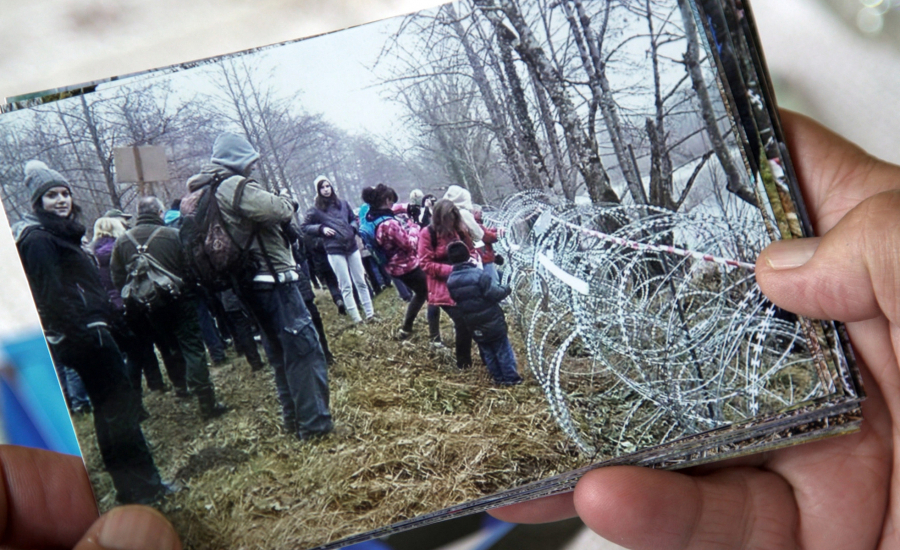12/08/2021
Refugee deterrent border fences add to the already complicated relationship between the Croats and Slovenians of the Kupa region.
Director: Tiha K. Gudac
Producer: Frederik Nicolai, Eric Goossens
Country: Belgium, Croatia, Lithuania, Norway, Slovenia
Yugoslav history and Balkan borders are famously complicated. This is why Croatian director Tiha K. Gudac had to put current facts as plainly as possible at the beginning of her second feature-length documentary The Wire.
The film is a part of Borderline Collection, a series of six documentaries about life around borders in Europe. It deals with a fence that the Slovenian government installed on the river Kupa, marking a part of its border with Croatia, in order to stop refugees from entering Europe proper. Both countries are EU members, but Croatia is not in the Schengen Area. Currently, 187km of the 667km-long border is protected with fence, much of it razor-wire.
An opening voice-over explains how for centuries both nations lived side by side as good neighbours, friends, and even lovers. The film proves things are not that simple, by contrasting attitudes of the left-wingers, heirs of the communist tradition of Yugoslavia, and of right-wingers who rather identify with Second World War Nazi collaborationists – Ustasha in Croatia and Domobrani in Slovenia.
Gudac picked out a couple of protagonists belonging to both ideologies, and but also provides plenty of room for migrant testimonies – whom the right-wingers call «illegals», and leftists, «refugees». Sitting in the middle of the road is the owner of a company that caters to tourists on the river. It is a popular destination, with its clear, green water and beautiful surrounding forests. His business is now at risk – razor wire is hardly a magnet for visitors – and he never saw any refugees there. However, another regional man says he met the migrants, fed them, and they stole his boat.
A farmer, grandson of one of the Domobrani killed after the war ended, relates horrific, hard to believe stories of torture and even cannibalism. Later, we see him with his wife and son, actively looking for illegals to «chase them away» (their attitude rather implies physical violence), as they themselves illegally duck under the wire to go to the other side.
On the other hand, a left-wing professor and artist comments that the razor wire reminds him of his visit to Auschwitz. He also attends the annual commemoration of the region’s Partisan movement, which is contrasted with a celebration of «friendship between the two sides» in the form of a swimming competition. An Ustasha flag can be spotted in the background of the sunny, bright-coloured event where contestants swim on two sides of the Schengen border.
These sequences are interspersed with refugee testimonies, set in a voice-over against images going through the dense forest (refugees call it «jungle») to a dramatic, often menacing score. It is well-known that Croatian police abuse and rob those who manage to cross into the country from Bosnia before they send them back. In an extended segment in Bosnia, we finally get to see these people who Gudac quite rightly implies are invisible in Croatia and Slovenia – at least to the regular citizens who are not fascists, or activists who try to help them – as the states certainly won’t.
One such person in Bosnia, whom the refugees call Mama, runs a centre where she hosts and feeds them. This part, even if it sticks out stylistically to a certain degree, is crucial for the message about whose lives are really at stake. Croats and Slovenians around the border may be inconvenienced, but this is nothing compared to the humanitarian disaster that the EU has created and keep perpetuating.
Gudac’s powerful first film, Naked Island, told the story of the Yugoslav gulag that her grandparents survived in the 1950s. This may provide a clue as to where her need to balance ideologies come from: even if this communist country was much more liberal than, say, Hungary or Romania, it had its considerable share of political oppression. But today, with the rapid rise of fascism everywhere in Europe, with Slovenia’s decidedly right-wing government and the state-sponsored revisionism that has resurrected the Nazi puppet Independent State of Croatia, who is actively burying the heritage of Europe’s first and largest resistance movement, it’s important to remember that ideologies can’t be simply equalised.
There is no right or wrong choice here for a filmmaker, and the worst option would be to pretend fascists are not all around us, feeling increasingly safe to spout out their hateful propaganda and attack minorities and refugees. Populistic political parties cater to the lowest common denominator and it is easy to rile people up with fears of the Other. Liberal arrogance and belittling of misguided, «ignorant masses» therefore serves little purpose beyond widening the chasm in our divided societies. Gudac certainly made one correct, crucial decision: to end her film on an uncomfortable note and with a clear message about the nature of the wire and who it is meant to, effectively, destroy.
Review by Vladan Petkovic, published in MODERN TIMES REVIEW


